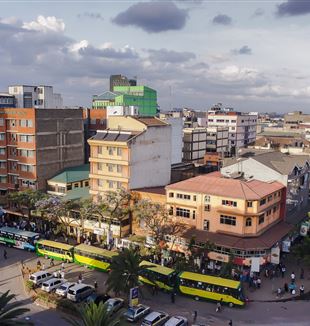
A Stronger Bond
People set in motion not because of an effort, but by the need to share their lives, their work, and the way they raise their children, describe their experience. A revolution in Africa: the end of solitude.“I still remember the first time I got invited to the Fraternity. I was surprised by the fact that the topic of the discussion was real-life problems. At the time, Stefano Pizzi had to decide whether or not to go work in Ethiopia. I was impressed because they didn’t face the problem just within the family but together with their friends, which for me was really something exceptional, a true revolution. These are issues that usually get discussed by the family, between a husband and a wife.” So begins Romana Jepto Koech, who belongs to the Nairobi Fraternity group, founded more or less six years ago by an Italian family and an Italian-German family–the Pizzis and the Diefenhardts. Since 2001, many things have changed. The Pizzis first and then the Diefenhardts left Kenya, to move respectively to Ethiopia and Germany. Today, the Fraternity includes four families, with a total of eleven children. “Still, every time we meet again with Elena, Marigió, and their families, it feels like they never left.... Even today they are an important point of reference for me, in the way I face my everyday life and, most of all, in the relationship with my family.” Those who know African society and its history can’t but be struck by this small group of friends, who are so aware of the Event that grabbed their lives-changing them-and that alone can change the society they live in.
The Urgent Need to Share
“At the beginning, when the two families left, we thought that things would never be the same,” adds Joakim, a high school teacher. “On the contrary, the desire and the urgent need to have a place where we could share our lives were so strong that getting together became indispensable. To make a long story short, we were not set in motion because of an effort, but by the need to share our lives. The relationship with the Pizzis and the Diefenhardts has been important, without doubt, for the care and attention they showed toward their families, most of all with respect to their children’s upbringing. So, as for a process of osmosis, that same care and attention was generated within us, too.” “In fact, it is precisely the help I get in the Fraternity with the raising of my children that accompanied me the most for the past two years,” explains Henry Kamande, one of the first to join the Movement in Kenya. “The choice of which school to send our children to has always been a delicate and important one, but thanks to our friendship and the experience we share, everything is simpler now, and I’m more certain of my own choices.” Joakim adds, “As a matter of fact, in choosing the school, we can’t but start from the experience we live. We want for our children a school where they can be looked at as human beings.”
Keep in mind that as of today in Kenya, precisely in Nairobi, there is a kindergarten, two elementary schools, a high school, and a trade school, founded by parents and teachers who are living the experience of the Movement.
“It’s truly beautiful to see how the Fraternity has become important even for our children,” explains Consolata. “For example, if by chance we don’t get together, my daughter wants to know what’s going on. A beautiful friendship has started among the kids, too; they seek each other out. The Fraternity has been a revolution for me as well. At the beginning, I was a bit uneasy–the schedule of our meetings and the fact that Elena moved to Ethiopia discouraged me. Then I decided to commit to these relationships, so now, when I have difficulties, these are the people I go to, while before I used to go to my parents! It is truly something exceptional, because we share our lives. Today, it’s difficult to find any other place where my ‘I,’ as it is, is taken seriously.”